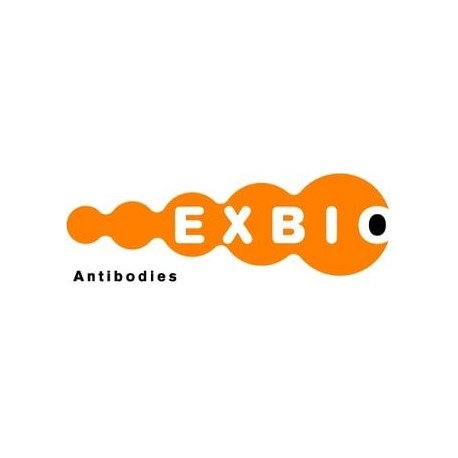Cart 0 Product Products (empty)
No products
To be determined Shipping
0,00 € Total
Prices are tax excluded
Product successfully added to your shopping cart
Quantity
Total
There are 0 items in your cart. There is 1 item in your cart.
Total products (tax excl.)
Total shipping (tax excl.) To be determined
Total (tax excl.)
Data sheet of Mouse Monoclonal to CD95 / Fas
| Brand | Exbio |
| Product type | Primary antibodies |
| Reactivity | Human |
| Clonality | Monoclonal |
More info about Mouse Monoclonal to CD95 / Fas
| Brand: | Exbio |
| Product no.: | 10-395-C025 |
| Product type: | Primary antibodies |
| Host species: | Mouse |
| Product name: | Mouse Monoclonal to CD95 / Fas |
| Antigen: | CD95 / Fas |
| Clonality: | Monoclonal |
| Clone: | UT-1 |
| Isotype: | IgM |
| Immunogen: | HUT-78 human T cell lymphoma cells |
| Format: | azide free |
| Specificity: | The antibody UT-1 reacts with CD95 (Fas/APO-1), a 46 kDa glycoprotein of the tumour necrosis factor/nerve growth factor (TNF/NGF) receptor superfamily, expressed on a variety of normal and neoplastic cells. The antibody UT-1 does excellently induce Fas mediated apoptosis, similarly as CH11 antibody. |
| Categories: | Apoptosis (Human), CD and Related Antigens (Human), Apoptosis |
| Concentration: | 1 mg/ml |
| Storage buffer: | Azide free HEPES buffered saline (HBS), approx. pH 7.0; 0.2 um filter sterilized. |
| Storage / stability: | Store at 2-8°C. Do not freeze. Do not use after expiration date stamped on vial label. |
| Background: | CD95 (Fas, APO-1), a 46 kDa transmembrane glycoprotein, is a cell death receptor of the TNFR superfamily. Stimulation of CD95 results in aggregation of its intracellular death domains, formation of the death-inducing signaling complex (DISC) and activation of caspases. In type I cells caspase 3 is activated by high amounts of caspase 8 generated at the DISC, in type II cells low concentration of caspase 8 activates pathway leading to the release of cytochrome c from mitochondria and activation of caspase 3 by cytochom c. Besides its roles in induction of apoptosis, Fas also triggers pro-inflammatory cytokine responses. |
| Purity: | > 95% (by SDS-PAGE) |
| Purification: | Purified by precipitation and chromatography |
| Product specific references: | *Matsuyama W, Mitsuyama H, Ono M, Shirahama Y, Higashimoto I, Osame M, Arimura K: Discoidin domain receptor 1 contributes to eosinophil survival in an_x000D_ NF-kappaB-dependent manner in Churg-Strauss syndrome. Blood. 2007 Jan 1;109(1):22-30. |
| General references: | *Brumatti G, Yon M, Castro FA, Bueno-da-Silva AE, Jacysyn JF, Brunner T, Amarante-Mendes GP: Conversion of CD95 (Fas) Type II into Type I signaling by sub-lethal doses of cycloheximide. Exp Cell Res. 2008 Feb 1;314(3):554-63._x000D_ _x000D_ , *Guo Z, Zhang M, Tang H, Cao X: Fas signal links innate and adaptive immunity by promoting dendritic-cell_x000D_ secretion of CC and CXC chemokines. Blood. 2005 Sep 15;106(6):2033-41._x000D_ , *Park DR, Thomsen AR, Frevert CW, Pham U, Skerrett SJ, Kiener PA, Liles WC: Fas (CD95) induces proinflammatory cytokine responses by human monocytes and monocyte-derived macrophages. J Immunol. 2003 Jun 15;170(12):6209-16._x000D_ _x000D_ _x000D_ , *Scaffidi C, Fulda S, Srinivasan A, Friesen C, Li F, Tomaselli KJ, Debatin KM, Krammer PH, Peter ME: Two CD95 (APO-1/Fas) signaling pathways. EMBO J. 1998 Mar 16;17(6):1675-87._x000D_ _x000D_ |
| Related products: | - Mouse Monoclonal to CD99 - Mouse Monoclonal to CD97 - Mouse Monoclonal to CD98 |
| Shipping condition: | Room temperature |


